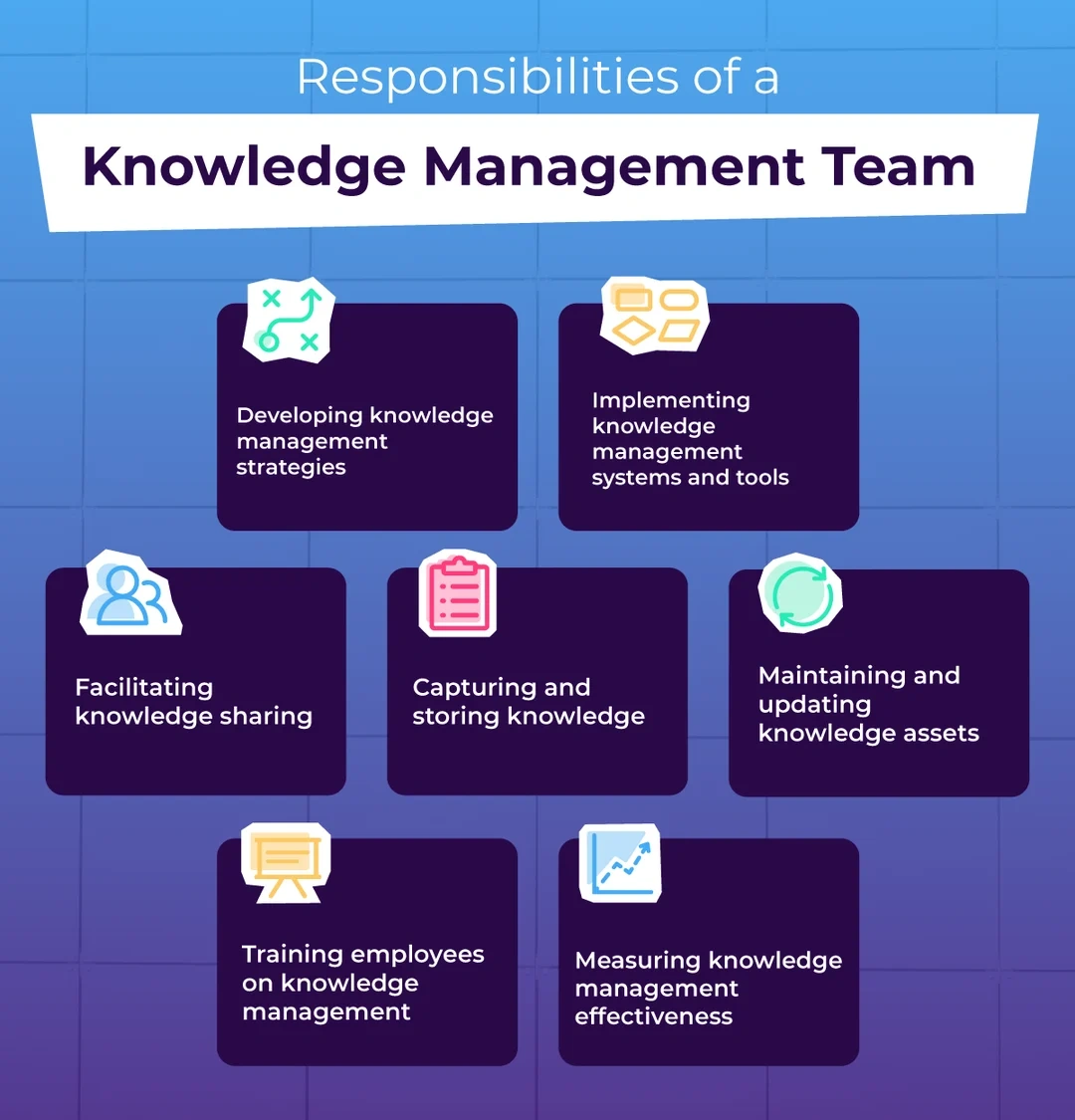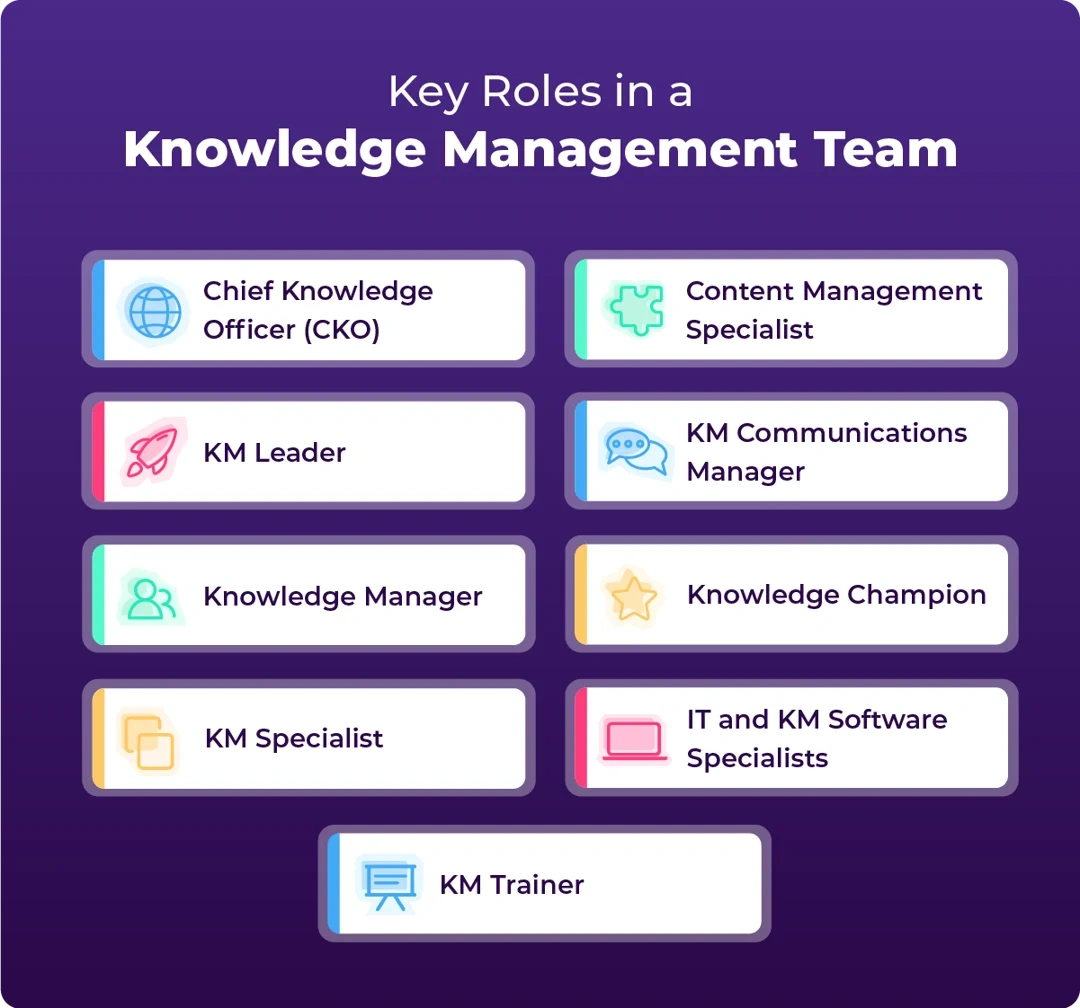Organizations generate, store, and share vast amounts of information daily. Without a structured approach to managing knowledge, companies risk inefficiencies, knowledge loss, and compliance risks. In fact, the average knowledge worker spends 30% of their workday searching for information. With the right knowledge management in place, organizations can save employees at least one hour per week by reducing their time spent on this task.
A knowledge management team ensures that knowledge is systematically captured, organized, and shared to enhance productivity, decision-making, and collaboration. By implementing effective knowledge management strategies, businesses can maintain organizational knowledge, prevent silos, and drive innovation. This blog explores what a knowledge management team is, why it is essential, its responsibilities, key roles, common challenges, and how to build a strong knowledge management team.
What is a knowledge management team?
A knowledge management team is a dedicated group of professionals responsible for overseeing the creation, organization, sharing, and maintenance of an organization's knowledge assets. These teams implement strategies and technologies that help employees access and utilize knowledge efficiently, ensuring that critical information is not lost and remains available for decision-making and operational improvements.
The primary goal of a knowledge management team is to bridge knowledge gaps by establishing structured knowledge repositories, fostering collaboration, and implementing systems that encourage knowledge-sharing across departments.
- A dedicated group responsible for overseeing the creation, organization, sharing, and maintenance of an organization’s knowledge assets.
- Implements strategies and technologies to help employees efficiently access and use knowledge.
- Bridges knowledge gaps, fosters collaboration, and ensures critical information is available for decision-making and compliance.
- Supports business continuity and continuous improvement by analyzing knowledge usage trends and implementing optimization strategies.
Why is a knowledge management team is essential for organizational success?
A knowledge management team ensures that information is properly organized, shared, and retained, making it a critical asset for any organization. By having a structured knowledge management approach, businesses can improve efficiency, collaboration, and innovation while minimizing risks such as knowledge loss and non-compliance.
Prevents knowledge loss
When employees leave, they take valuable knowledge with them unless it is documented. A knowledge management team ensures critical institutional knowledge is captured, structured, and stored systematically, reducing the risk of knowledge loss. This documentation also allows for easier training and succession planning, ensuring smooth transitions during workforce changes.
Enhances collaboration
Organizations often struggle with siloed knowledge that hinders teamwork. A knowledge management team facilitates cross-departmental collaboration by implementing centralized knowledge-sharing platforms, encouraging open communication, and organizing knowledge exchange sessions. By breaking down barriers, employees can efficiently access and contribute to shared knowledge, leading to better teamwork and more effective decision-making.
Improves efficiency
Employees frequently spend significant time searching for information, leading to productivity losses. A knowledge management team ensures knowledge is properly categorized, indexed, and easily accessible through digital tools. By streamlining knowledge retrieval processes, teams can focus on their core tasks rather than duplicating efforts or searching for information scattered across different sources.
Boosts innovation
Innovation thrives when employees can build on existing knowledge rather than starting from scratch. A knowledge management team promotes the sharing of best practices, lessons learned, and creative problem-solving techniques. By providing access to past experiences and expert insights, the team fosters a culture of continuous improvement and encourages employees to develop new ideas that drive business growth.
Ensure compliance
Many industries, such as finance, insurance, and utilities, must comply with strict regulatory requirements regarding knowledge documentation and retention. A knowledge management team ensures organizations maintain comprehensive records, adhere to industry standards, and provide employees with accurate and up-to-date compliance guidelines. This minimizes legal risks and enhances organizational credibility by demonstrating regulatory adherence.
What are common challenges in knowledge management teams?
Despite their importance, knowledge management teams face several challenges that can hinder their effectiveness. Addressing these obstacles is crucial to ensuring the successful implementation of knowledge management strategies.
Resistance to change
Employees may be reluctant to adopt new knowledge management processes or share their expertise due to a lack of incentives or fear of redundancy. Overcoming this requires fostering a culture of knowledge-sharing through leadership support, clear communication, and training.
Information overload
Organizations generate vast amounts of data daily, making it difficult to filter valuable knowledge from irrelevant content. knowledge management teams must implement effective categorization, AI-powered capabilities, and regular audits to maintain knowledge quality.
Siloed knowledge
Different departments may hoard knowledge, leading to inefficiencies and missed opportunities. Encouraging cross-departmental collaboration and using centralized knowledge-sharing platforms help break down these silos.
Outdated or redundant information
Knowledge repositories can quickly become cluttered with outdated or duplicated information. Regular content reviews, version control mechanisms, and user feedback loops ensure that only relevant and up-to-date knowledge is retained.
Limited engagement
If employees do not see the value of knowledge management initiatives, they may not actively contribute. Providing clear benefits and recognition programs can encourage participation and engagement.
What are knowledge management team responsibilities?
A knowledge management team has several responsibilities that help streamline knowledge-sharing and improve organizational effectiveness. Their tasks range from implementing knowledge management tools to training employees on best practices and ensuring knowledge is regularly updated and accessible.

Developing knowledge management strategies
Establishing and implementing structured knowledge management frameworks, policies, and workflows to guide knowledge-sharing efforts. These strategies ensure alignment with business objectives and create a roadmap for effective knowledge dissemination.
Implementing knowledge management systems and tools
Selecting, deploying, and managing knowledge bases and collaboration platforms that enable employees to efficiently store, retrieve, and share information. The right tools streamline workflows and enhance knowledge accessibility.
Facilitating knowledge sharing
Organizing training sessions, workshops, and knowledge-sharing initiatives such as communities of practice. These activities help cultivate a culture of continuous organizational learning and collaboration.
Capturing and storing knowledge
Creating structured processes to document tacit and explicit knowledge. Ensuring that knowledge is well-documented and preserved allows for seamless knowledge transfer and minimizes disruptions from employee turnover.
Maintaining and updating knowledge assets
Regularly reviewing, curating, and refining knowledge repositories to ensure relevance and accuracy. Keeping information up to date prevents employees from relying on outdated or incorrect data.
Training employees on knowledge management
Educating employees on knowledge management best practices and equipping them with the necessary skills to contribute to knowledge-sharing efforts. Effective training enhances engagement and encourages knowledge contributions.
Measuring knowledge management effectiveness
Establishing key performance indicators (KPIs) such as system usage rates, knowledge contribution levels, and the overall impact of knowledge-sharing initiatives. Continuous assessment ensures knowledge management strategies remain effective and adaptable to organizational needs.
What are key roles in a knowledge management team?
A well-defined knowledge management team consists of professionals with specialized roles, ensuring that knowledge is effectively managed and utilized. Each role plays a crucial part in maintaining an organized, efficient, and collaborative knowledge-sharing environment.

Chief Knowledge Officer (CKO)
A senior executive responsible for defining and leading the overall knowledge management strategy. The CKO ensures alignment with business goals, secures leadership buy-in, and promotes a culture of knowledge-sharing.
KM Leader
A senior leader who drives the vision and direction for knowledge management initiatives within the organization. They ensure alignment with strategic business goals and champion the value of knowledge management.
Knowledge Manager
Oversees the knowledge management team’s operations, ensuring knowledge is effectively organized, maintained, and accessible. They collaborate with different departments to implement knowledge management best practices and enhance knowledge flow across the organization.
KM Specialist
A subject matter expert who manages specific knowledge areas or systems. They work closely with teams to ensure accurate and consistent knowledge capture and organization.
Content Management Specialist
Focuses on organizing, curating, and maintaining content within knowledge systems. They ensure that knowledge is easily accessible, up-to-date, and properly categorized.
KM Communications Manager
Oversees the communication strategy around knowledge-sharing initiatives. They ensure clear messaging, promote engagement, and facilitate collaboration across teams.
Knowledge Champion
Advocates for the adoption of knowledge management practices within the organization. They encourage employees to actively contribute to and utilize knowledge-sharing systems.
IT and KM Software Specialists
Support, maintain, and troubleshoot knowledge management systems and tools, ensuring they remain functional, secure, and user-friendly. Their expertise is critical for integrating technology into knowledge management strategies.
KM Trainer
Provides training to employees on knowledge management tools and best practices, helping them improve their knowledge-sharing habits and ensuring effective use of knowledge management systems.
In Summary: Building a Strong Knowledge Management Team
A dedicated knowledge management team plays a vital role in capturing, organizing, and sharing knowledge to improve efficiency and collaboration.
-
Key team members include: Chief Knowledge Officer (CKO), Knowledge Manager, KM Specialists, Content Managers, Communications Managers, Knowledge Champions, IT/Software Specialists, and KM Trainers.
-
Core responsibilities involve: Developing strategies, implementing tools, facilitating knowledge sharing, capturing and maintaining knowledge assets, training employees, and measuring effectiveness.
-
Clear roles and accountability help align knowledge efforts with business goals and maintain quality and accessibility.
-
Overcoming challenges like resistance to change, information overload, and knowledge silos is essential for success.
-
Monitoring key performance indicators (KPIs) supports continuous improvement and maximizes knowledge value.
Building and supporting a knowledgeable, engaged team drives better decision-making, ensures compliance, and fosters sustainable organizational growth.
Getting started with a knowledge management team in your organization
A well-structured knowledge management team is essential for organizational success, ensuring that valuable knowledge remains accessible, organized, and actionable. By defining clear roles, responsibilities, and best practices, businesses can create a knowledge culture that empowers employees and boosts organizational efficiency.
Visit our features page to learn more about how a dedicated knowledge management team can improve employee productivity, streamline operations, and drive continuous business growth.



